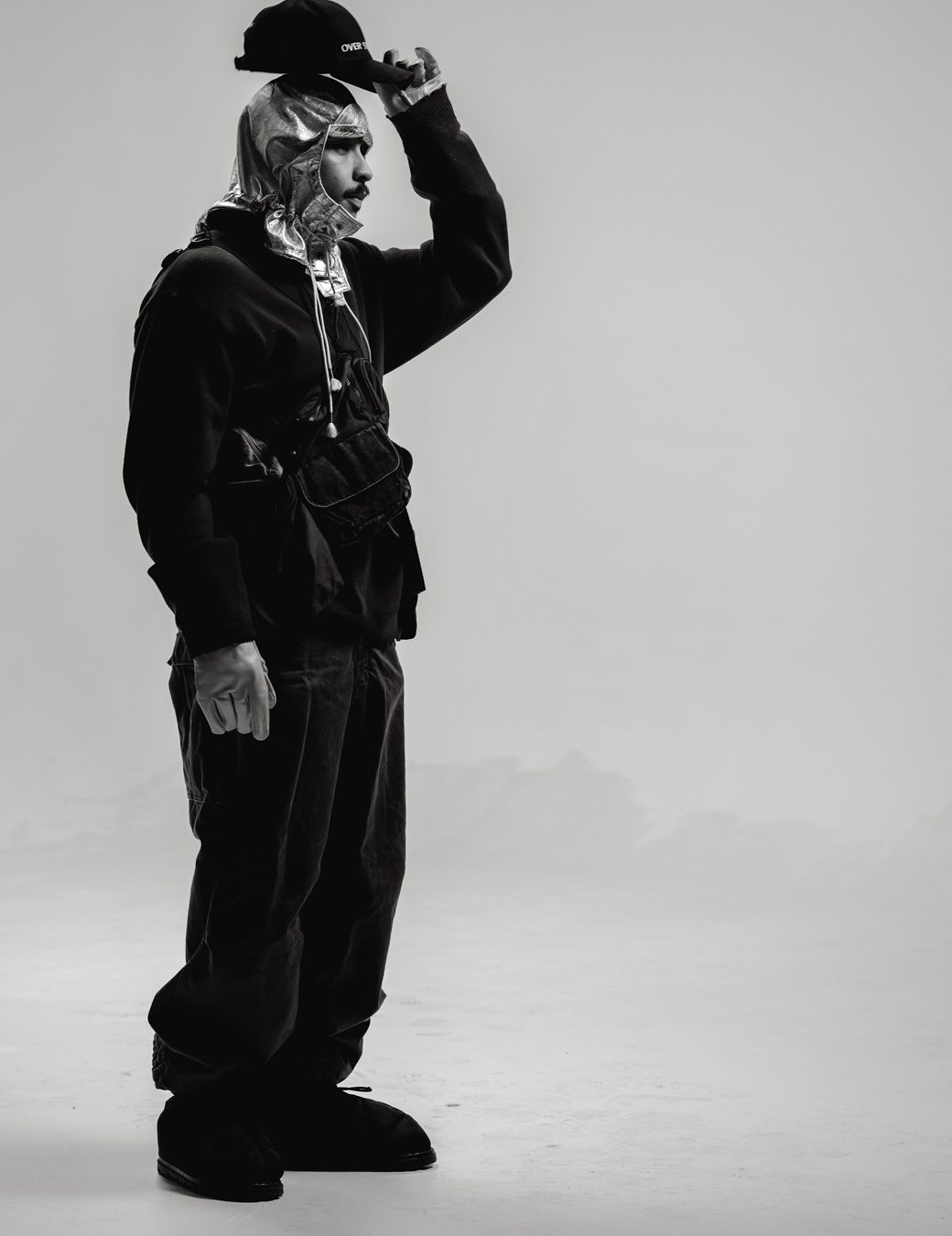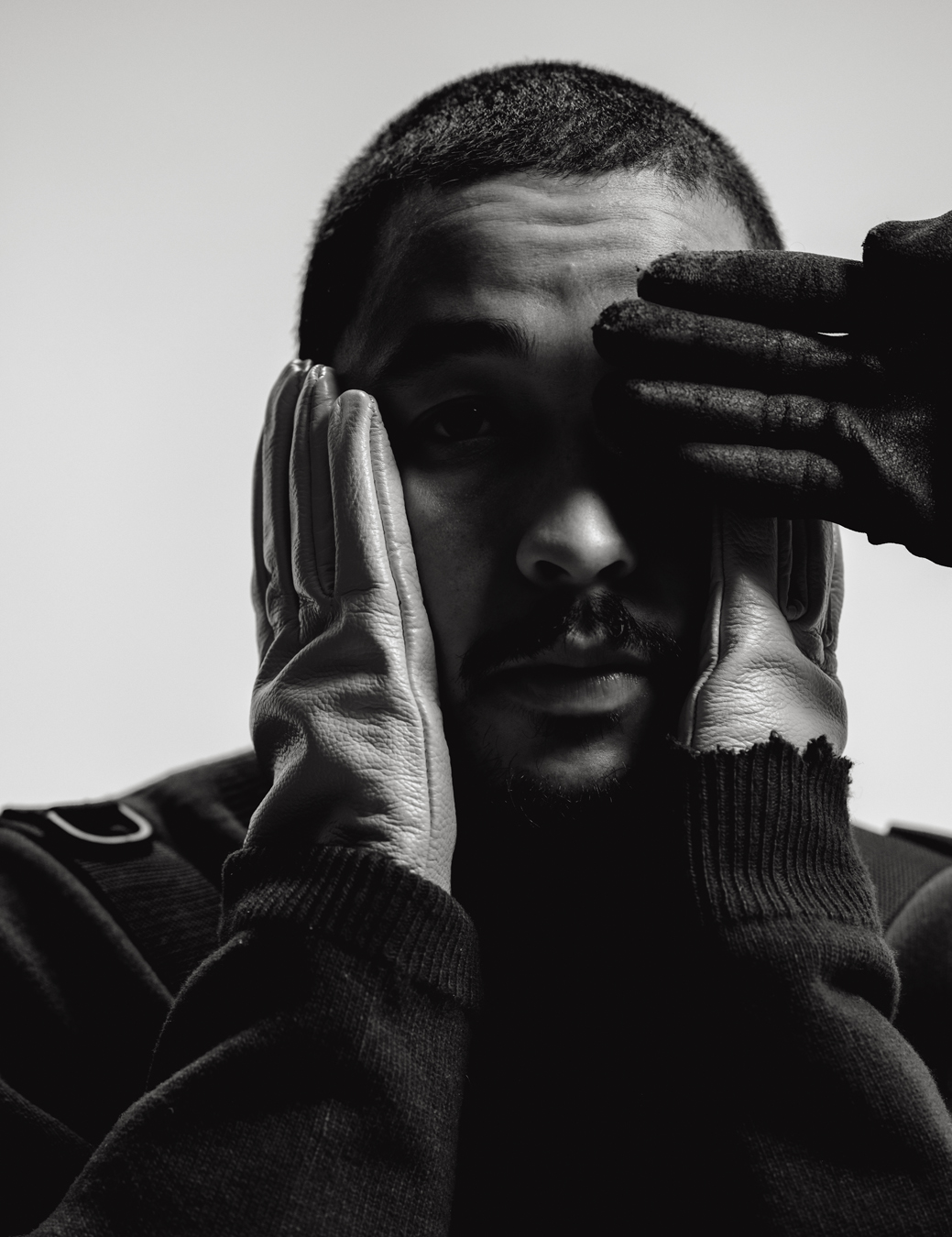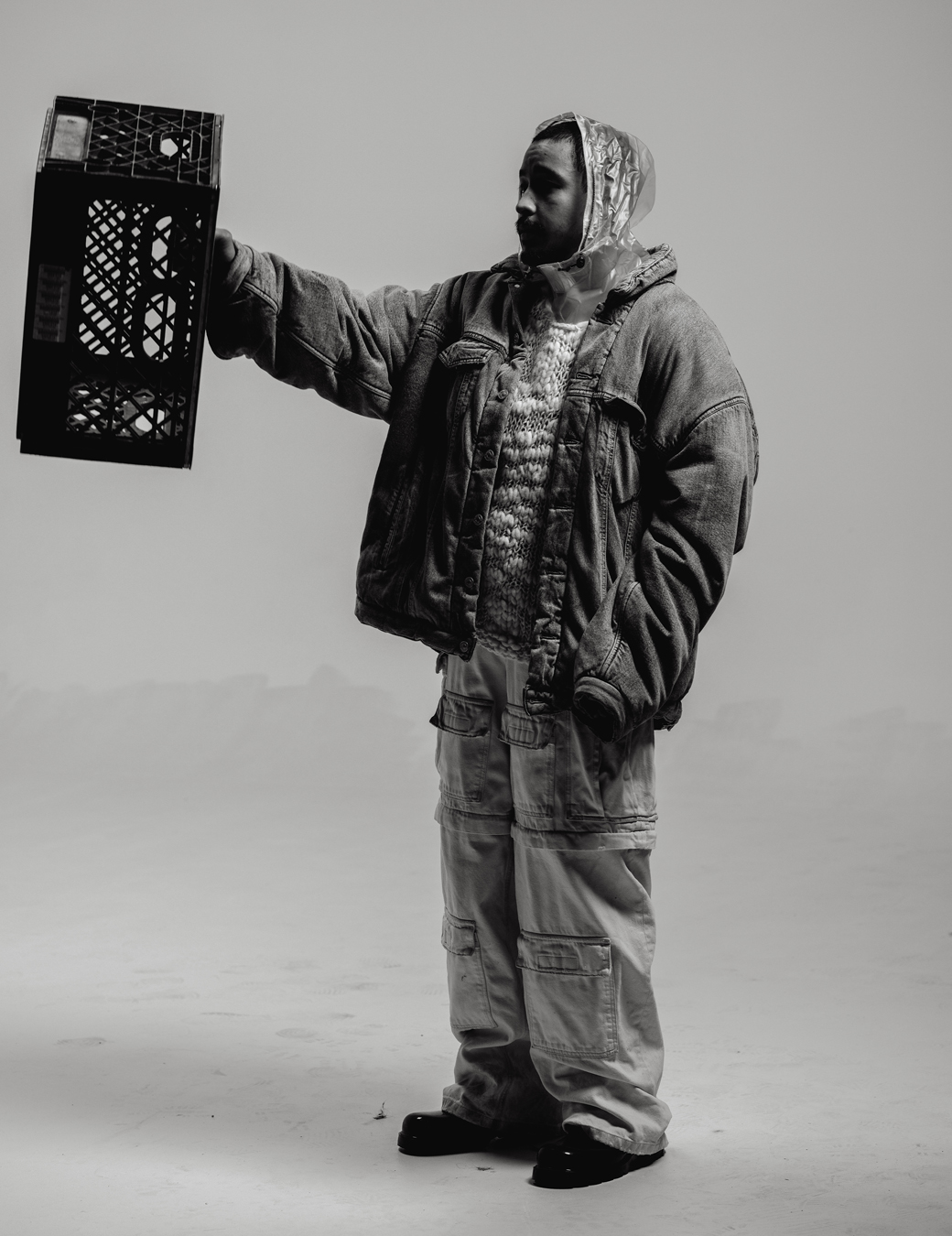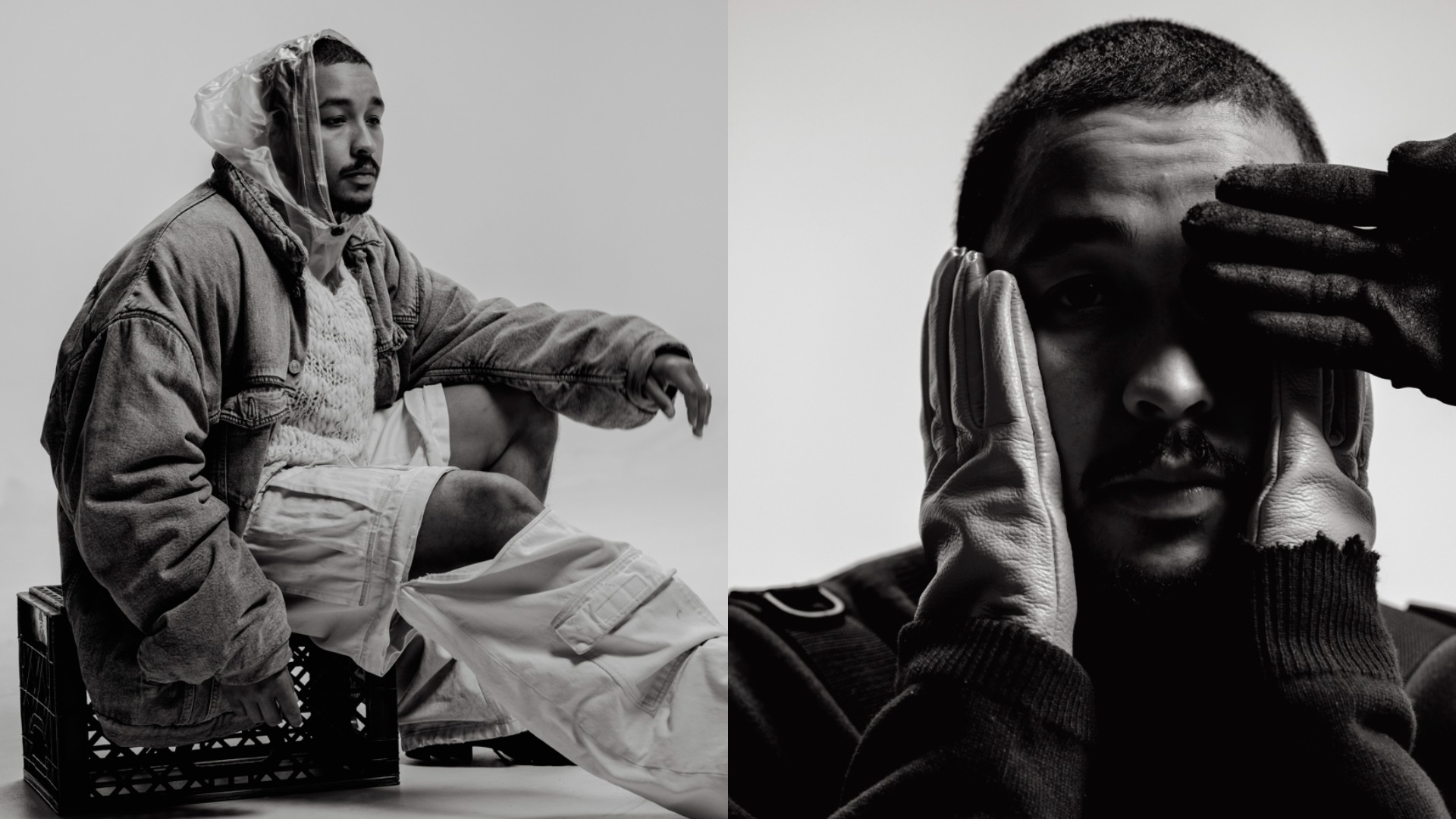This story originally appeared in i-D’s The Out Of Body Issue, no. 367, Spring 2022. Order your copy here.
After releasing his debut album Absolutely, Dijon Duenas felt overwhelmed and slightly depressed. Sure, he was glad that the music he made with friends over the course of the pandemic was out in the world, grateful that people seemed to be enjoying it, and excited about further evolving his sound with his next release. “But it kind of felt like the secret was out,” the 29-year-old musician says in between sips of coffee at a brightly-lit Brooklyn cafe. “We built up this really fun spirit behind the scenes, and when it came out everybody didn’t speak to each other for a few days. It was sad… you feel a kinship with your friends. You feel a kinship with the space, and knowing that the record was out was difficult to process at first.”
Over the last few years, Dijon’s released a string of hazy-but-tender, R&B singles and EPs, including the folksy Sci Fi 1 in 2019, and the slightly more experimental falsetto-filled How Do You Feel About Getting Married? in 2020. He’s also collaborated with just about all your favourite musicians — from Brockhampton to Charli XCX — but his 2021 album, Absolutely, marked the first time Dijon had let others into his creative process.

Some months into the uncertainty of 2020, the LA-based, Baltimore-raised artist started inviting friends over to his home studio. Dijon called up Michael Gordon, who goes by Mk.gee, and the pair made the first song on the album: “Big Mikes”, a slow-burning and sweet tribute to Dijon’s fiancée, Joanna. Slide guitar, clarinet, drums and “a tasty organ pass” swell around his vocals in a way that’s both raw and hypnotic. It’s an implicitly unpolished welcome to the sonic world that he and Mike constructed over the course of the record’s twelve tracks.
Dijon, who started making music when he was about fifteen years old, extended the same invite to a “revolving door of collaborators”, including friends Jack Karaszewski, John Keek, and Noah Le Gros. The recording process was a bonding experience — made particularly resonant in that the entire world was shut down and no one knew when it would open back up. With their guard down, Dijon and his crew made some “utterly bonkers” songs, and ultimately, one of the most exciting albums of 2021. “When the pandemic hit I was able to process opportunities that I may have had or not had,” Dijon told me. “My need for collaboration came through living in LA for years, and taking the hits made me a little more prepared for when the ideas for the album started to come. Plus I met my fiancée, so…”

Absolutely tackles the ups, downs, and evolution of long term relationships. On “Many Times” Dijon speaks to the intensity and growing frustration of a disagreement, while on “The Dress” he suggests a night out to restore the spark: “We should go out and dance like we used to dance / We should go out and hold hands like lovers hold hands.” There is also a wide range of other subjects on the album, including a cross-country road trip soundtracked by Gillian Welch (“Talk Down”) and a psychedelic trip turned UFO sighting (“Did You See It?”). “This record is a lot more hyper-specific than most of the things I’ve done,” Dijon says, noting that he looked to evocative songwriters like Adrianne Lenker, Bruce Springsteen and countless others for lyrical inspiration. “I really enjoyed starting a song off with one detail that’s extremely personal, and then stretching a more exaggerated version of that until it wasn’t about me anymore.”
Dijon wanted to take a more immediate approach to songwriting with Absolutely, and he also wanted to explore — and rebel against — the idea of a band’s frontman being a likeable, trustworthy ringleader, both behind the scenes and on stage. “That’s how “Rodeo Clown” came about,” Dijon says, adding that it was written right after “Big Mikes”. “I watched myself on tour become a character sometimes.” The song explores feelings of exhaustion, fear, and shame through the eyes of a prize-winning bullfighter’s disappointed lover. “There’s a pain but there’s also a value in being disliked. How do you form this character that might be unfavourable? And maybe unreliable?”
“I really disliked touring, and New York City was the culmination of it. I was retaliating against it. Honestly, a lot of the record is a reaction to how I was performing and how I wanted to present myself.”
Dijon wore out his voice until it was raspy, pushing his vocals past their breaking point. “Tell me, what are you so afraid of? / ‘Cause you’re missing out on / Some good, good lovin’,” he sang before tears took over. He contorted and manipulated his body during the vocal take, playing with the sonic depth of the recording while his voice was strained. “I started projecting and bending my body in different ways just to see what it would do.” It was a “fun experiment”, Dijon says, but it was physically and emotionally taxing, in that it harkened back to a darker time.
In February 2020, Dijon played a sold-out show at Bowery Ballroom in New York. It was his first-ever solo tour. The crowd swayed to his earlier, more sultry tracks like “Skin” and “Drunk”, but Dijon recalled being really upset over his performance there. “We didn’t take it as seriously. I was pretty drunk during it,” he says. “I really disliked touring, and that was the culmination of it. New York City is an important place, and I think I just retaliated against that… Honestly, a lot of the record is a reaction to how I was performing, and how I wanted to present myself.”

Insert “the manifesto”. About three songs into his new record, Dijon and his crew decided that they would only use one mic to record their sessions; it would remain fixed within the space and songs would be recorded constantly. This approach places the listener in the studio, and stimulates the senses so that they feel like they are there, taking it all in: a friend laughing in the background, static on a nearby tv, the top popping on a Modelo. “I wanted to create depth to it, and there to be a little bit of confrontation,” Dijon reflects. “We wanted the world to be disorienting… It’s an attempt to highlight how truly bizarre it is – not just being alive but to make music.”
At one point, Dijon and his friends got really excited about the fact that Absolutely was a pandemic record. If we truly were about to enter the apocalypse, it would show future beings how earnest music was really made — as opposed to glossy, high-production pop. In some of the demos that didn’t make the cut, which were eight or nine minutes long, you’d hear a song that spun-out and collapsed when everyone got bored. There’s a documentary quality and a “loose freestyle architecture” to it all, where anyone in the room might have launched into a riff or vocal take and reacted to it, “like little kids on a playground,” Dijon says.

Making music has always been about connection for Dijon. His parents were both in the military and so he grew up across the country – California, Hawaii, Kentucky, Maryland and Washington – later graduating from high school in Germany. He spent a significant amount of time in Baltimore; that was home, but moving around made it difficult to make friends and maintain relationships. In his teens, Dijon started making beats and sharing them with his friends back in Maryland as a means to keep in touch. This continued when Dijon went on to study at the University of Maryland, and accidentally started the buzzy alt-R&B group, Abhi//Dijon, with his buddy.
It’s only natural, then, that Dijon’s solo debut is a return to what he loved most about music all along – its ability to foster connection. From Absolutely, “Noah’s Highlight Reel” was both Dijon’s favourite song to create and where his creative process reached its synthesis. Someone suggested that Noah, who plays guitar on a number of tracks, try writing a song — his first-ever — while Dijon and Mike assumed the role of the chorus and backing band. They ended up liking it so much that Dijon insisted Noah take over lead vocals, too. Though he sang of “honky tonk bars”, “rodeo lights” and “friday football games”, Dijon cited Ghostface Killah and Cam’ron as major influences. He channelled elements of rap and hip-hop in the physical production – sampling a video of a young Noah playing soccer, friends and family cheering him on in the background.

“I used to want to do everything by myself,” Dijon explained. “I was pretty insecure for a while, but over the course of the pandemic, I accepted that there are limitations. It opened up this idea that other people can provide pieces of your world, and you can provide pieces to their world that complement and enhance it.”
On the song “End Of Record” Dijon sings, “I know that you’ve been healed / By somebody else / Who gets your magic? / Who gets your spells?” The song captures exactly what the title suggests – a bunch of people sitting around a long dining room table, singing out of key and reflecting on the album they’ve made. There is a late-night lunacy to it, but Absolutely is a joyful celebration of the musicians in the room. Sure, it’s also about instability, shame, and surrendering to unconditional love, but really it’s about friendship. “And aliens,” Dijon adds. Trust us, it’s out of this world.
Follow i-D on Instagram and TikTok for more on music.
Credits
Photography Kevin Abstract.
fashion Nick Holiday and Joanie Del Santo.
Photography assistance Jakob Longcob.
Styling assistance (Nick Holiday) JP Goodell.
Styling assistance (Joanie Del Santo) Sam Coppel, Emily Rose and Catalina Bulgach.
Post production Henock Sileshi.


